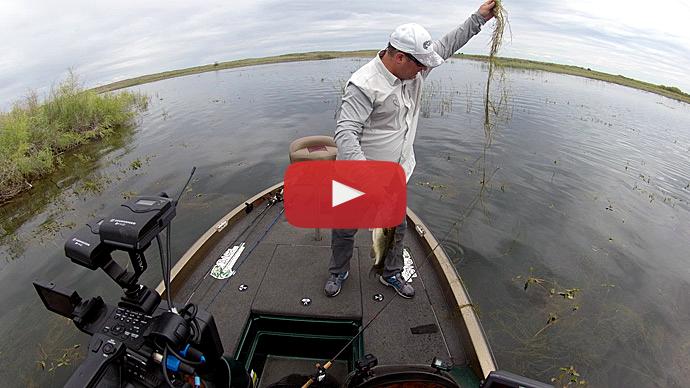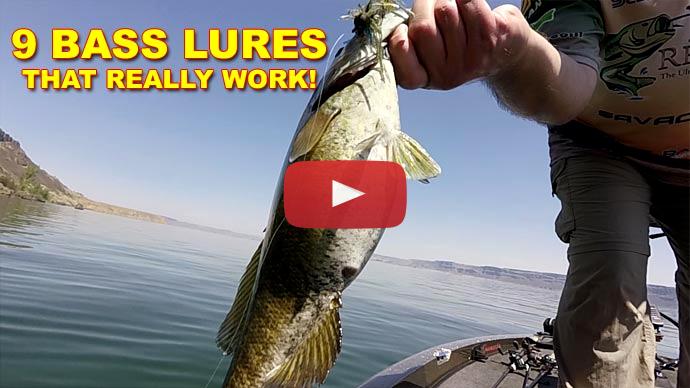Hey, folks. Glenn May here with BassResource.com, and today I want to talk to you about a tool that's often not talked about. It is something that is vital to the success of your fishing and yet most people don't really put as much thought into them as you would, say, your fishing gear such as you line, your reels, your rod, that sort of thing. That is your sunglasses. These, right here. Fishing sunglasses, the right kind do a variety of things for you on the water.
Why Fishing Sunglasses?
Obviously, they protect your eyes from the sun such as the harmful UVA and UVB rays, which, you know, if you guys are out on the water all the time, you need to have glasses just to protect your eyes. I mean, you're wearing sunscreen or you're wearing the buffs, I'm wearing sunscreen today, you have to do that to protect yourself. You've got to protect your eyes too, even when it's cloudy out. But they do more than that.
Polarized sunglasses allow you to look in the water and that's because they cut the glare down, the reflection down in the water, and you can see fish-holding structure. You can see rock piles. You can see logs. You can see weed lines. You can see pockets in the weeds, for example, in milfoil. And you can see under docks. It allows you to see what's going on, plus the baitfish activity, and it will help you tune in to what's going on underwater and help you catch more fish that way.
Also, they protect your eyes from objects. You know what I mean? We've fished enough times, so we know we end up hooking on something. You yank on it and guess what? You've got this lure coming back at you, at mach 80 with a bunch of hooks in it, it can come right back at your face. Or a fish strikes a lure and it's right at the surface and you set the hook and you miss them, here comes that lure. Well, these glasses here can protect your eyes from getting a hook in them.
So, there's a variety of things that you...reasons why you should get glasses, but let's dive into really what the components and what you need to look into to buy the right kind of glasses for you that's going to last you for a long time. Starting with the lenses.
Fishing Sunglasses: Lenses
The lenses themselves are basically two different colors you can get them in. One is this gray and the other shade is an amber or, kind of, an orange, or a copper tint. The amber or the gray ones, that's what these are. The gray tint is, kind of, your universal, all-around. If you can only get one pair of glasses, that's the shade you can get because it works whether it's sunny or cloudy outside, rainy, what have you, and it's pretty year-around, all-around purpose. Bright sunny days is really what they're best for but they work all around.
The amber ones or the copper ones, those are kind of a specialty but those are really for low-light conditions early morning, evening, really cloudy days or say, for example, you're sight fishing. What they do is will give you the contrast. When you're looking under water, it really brings a lot of contrast to the items underneath the water and you can see them better. So, it really helps you in those darker days to be able to see what's going on under the water.
More about lenses, they come in, basically, two different materials. There's glass and polycarbonate and there's advantages and disadvantages to both. And the glass traditionally has been the best as far as clarity. They've, obviously, been around for a long time. They're very clear. They offer greater visibility underwater, to a certain extent and you can get them in prescription, different ranges of prescriptions, a lot easier than you could polycarbonate. The problem with glass lenses is that they're heavy. Over the course of a day of fishing, that can weigh on you. I mean, if you're fishing on a hot summer day, the weight of the glasses can slide down your nose and just constantly you're messing with them all day along. The weight of it can also wear down on your nose and actually become uncomfortable.
Polycarbonate lenses, on the other hand, are a lot lighter, so they don't do that. The newer ones, in the last couple of years that have come out, they're actually really good quality and the difference in clarity between glass and polycarbonate has really come together quickly. The polycarbonate, even the curved ones, they are really distortion free these days. They've done really, really well. So, they have really good clarity and they're not as expensive as glass. That's another reason why they're really good.
The polycarbonate, this specifically one, these ones here are from Wiley X and these are actually industrial grade polycarbonate, meaning...I talked earlier about objects coming at your eyes, it's actually like a shop glasses. It won't shatter, it won't break under most conditions as something like a jig comes flying right back at your eye, it's actually going to protect your eyes. Whereas glass, depending on the manufacturer, it can shatter or crack. That could be a problem near your eyes. So, this was one of the reasons why I really like polycarbonate a lot better.
Fishing Glasses: Frames
But let's talk a little bit about the frames themselves. Again, they come in different materials, primarily metal or, you know, polymer. Metal has its benefits. It's more durable. It doesn't bend as much. You can accidentally sit on them and potentially not damage them as you might with the polymer lenses or glasses but they're also heavy. And if you have a metal frame with glass that...actually, it's given me headaches. I used to have glasses like that and it would give me a headache by the end of the day because of all the weight on the bridge of my nose and on my ears. My ears would start to hurt after a while.
So, these are nice and lightweight. These are called the Tide glasses. I really do like them because they're just super light. I don't even know I'll have them on all day long. The cool thing about, also, this type of material is the shape. As you can see, this is a wraparound design. This is called the Tide, if you want to know.
But there are some important things to think about when you're getting the shape because that's critical. For me, you want the shape to prevent any sort of light from getting inside your face or in inside the glenses. Anything that's not coming through the lens, you want to block out, completely block out. And that's what the wraparound design does, it completely blocks out the light. Even more so though, it has to fit your face. I have, kind of, a small, narrow face, so most glasses don't fit me right. They're too wide and when you have them too wide, say, for example, the sun is at your back, you've got the sun coming straight through or light reflecting off the water and it will come through, hit the inside of your lens and you get these bright flashes that are really annoying, very distracting, and it's hard to see.
And even if you don't have bright light going in there, if you have a little bit of light getting in there, you get this closeup of your eyeball that, again, it impedes, you know, the clarity and, you know, the see.
So wraparound for me, it has to block the light all the way around, including down here by my cheeks. Very, very important because, you know, when we're fishing, we're looking down all day long, looking downward and any light coming up, reflecting off the waters will get up underneath the bottom of the glasses and can, again, get in the way of you seeing things. It could almost blind you, this flashing lights of ripples off the water. For some people, the way their face is shaped, the light can come through the top of the frame. So, what's really important is for you to try on a variety of different frames to see what fits you best.
The Wiley brand, I think they have 40 different frames to fit a variety of different faces. So that's what I would go with and that's what I'm most familiar with. But there's, you know, other manufacturers too that make different frame sizes, so definitely try those on. The key thing here is that this is a tool and you got to put as much thought into it as you would your rods and reels.
I know some people don't like the wraparound design because they don't like the looks of it. If you're looking for a fashion show, get yourself another pair of glasses that you wear off the water. That's my best advice because when you're on the water, you need your equipment to work for you in order for you to catch more fish. The wraparound design is to kind of block the light on the side here, that sort of thing is what you want.
Colored Lenses
One other thing, if you noticed, this is a copper lens or copper mirror finish, they come in all kinds of finishes. I’ve seen green, blue, amber, there's all kinds of different...I like the copper. This is a gray shade with copper lens that is best suited for bright sunny days like today and you're fishing in shallow water. What the lenses do, the mirrored lenses cut out a certain bandwidth of light. Not a lot. It doesn't like eliminate it, but it reduces the amount of light coming in of a certain bandwidth. And, in this case, it cuts down on some of that bright sunshine when you're fishing in freshwater. Saltwater, you're out with nothing but water all around. You don't have land like this. And so, there's a lot of blue rays. So, a blue-mirrored finish actually is better for saltwater fishing. You don't have to look in shallow water there either. But this is what I like best for fishing in shallow water.
Caring for Fishing Glasses
Last thing I want to talk about is a little bit about care. Most glasses like this come with a lanyard. And you can also buy lanyards aftermarket but use them. Definitely use them. I know you, you drop them, you misplace them, you lose them, you put them down on your seat after you caught a fish and then guess what? You either to sit down on them and break them or you can step on them. The lanyards or free, use them. It took me a while to get used to mine. I didn't start using a lanyard until a couple of years ago because these, you know, glasses get expensive. They're over 100 bucks, so you want to take care of them.
They usually come with a case, put them in the case when you're done with them. So, again, you don't accidentally step on them or crushing them putting something on them. They usually have a soft cloth to keep them clean, definitely use that soft cloth. Don't use any cloth because you could scratch the lens, a little bit of care.
It's simple, basic stuff, guys. A lot of us don't do it, but when you're spending over 100 bucks on a pair of glasses, take the time to take care of them and they're going to last you as long as you take care of them. I have a pair of glasses that's over 30 years old now that I use for driving my truck now, but they will last you if you take care of them. Anyway, I hope that really helps you figure out what glasses work best for you. For more tips and tricks like this, visit BassResource.com.



